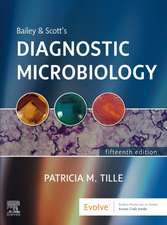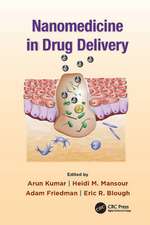Jawetz Melnick & Adelbergs Medical Microbiology 28 E
Autor Stefan Riedel, Stephen Morse, Timothy Mietzner, Steve Milleren Limba Engleză Paperback – 18 aug 2019
Preț: 776.81 lei
Preț vechi: 817.70 lei
-5% Nou
148.68€ • 153.22$ • 125.52£
Carte disponibilă
Livrare economică 10-24 februarie
Livrare express 24-30 ianuarie pentru 88.43 lei
Specificații
ISBN-10: 1260012026
Pagini: 1760
Dimensiuni: 216 x 277 x 31 mm
Greutate: 1.76 kg
Ediția:28
Editura: McGraw Hill Education
Colecția McGraw Hill / Medical
Locul publicării:United States
Cuprins
Preface
Section I Fundamentals of Microbiology
1. The Science of Microbiology
Introduction
Biologic Principles Illustrated by Microbiology
Viruses
Prions
Prokaryotes
Protists
Chapter Summary
Review Questions
2. Cell Structure
Optical Methods
Eukaryotic Cell Structure
Prokaryotic Cell Structure
Staining
Morphologic Changes During Growth
Chapter Summary
Review Questions
3. Classification of Bacteria
Taxonomy—The Vocabulary of Medical Microbiology
Criteria for Identification of Bacteria
Classification Systems
Description of the Major Categories and Groups of Bacteria
Nonculture Methods for the Identification of Pathogenic Microorganisms
Updates to Taxonomic Changes
Objectives
Review Questions
4. Growth, Survival, and Death of Microorganisms
Survival of Microorganisms in the Natural Environment
The Meaning of Growth
Exponential Growth
The Growth Curve in Batch Culture
Maintenance of Cells in the Exponential Phase
Growth in Biofilms
Definition and Measurement of Death
Environmental Control of Microbial Growth
Strategies to Control Bacteria at the Environmental Level
General Mechanisms of Biocide Action
Specific Actions of Selected Biocides
Relationship of Biocide Concentration and Time on Antimicrobial Killing
Summary
Key Concepts
Review Questions
5. Cultivation of Microorganisms
Requirements for Growth
Sources of Metabolic Energy
Nutrition
Environmental Factors Affecting Growth
Cultivation Methods
Chapter Summary
Review Questions
6. Microbial Metabolism
Role of Metabolism in Biosynthesis and Growth
Focal Metabolites and Their Interconversion
Assimilatory Pathways
Biosynthetic Pathways
Patterns of Microbial Energy-Yielding Metabolism
Regulation of Metabolic Pathways
Chapter Summary
Review Questions
7. Microbial Genetics
Nucleic Acids and Their Organization in Eukaryotic, Prokaryotic, and Viral Genomes
Replication
Transfer of DNA
Mutation and Gene Rearrangement
Gene Expression
Genetic Engineering
Characterization of Cloned DNA
Site-Directed Mutagenesis
Analysis of DNA, RNA, or Protein-Expressing Clones
Manipulation of Cloned DNA
Chapter Summary
Review Questions
Section II Immunology
8. Immunology
Overview
Innate Immunity
Adaptive Immunity
Complement
Cytokines
Microbiome and Immune System
Hypersensitivity
Defects of the Immune Response
Tumor Immunology
Clinical Immunology Laboratory (Diagnostic Testing)
Chapter Summary
Review Questions
Section III Bacteriology
9. Pathogenesis of Bacterial Infection
Identifying Bacteria That Cause Disease
Transmission of Infection
The Infectious Process
Genomics and Bacterial Pathogenicity
Regulation of Bacterial Virulence Factors
Bacterial Virulence Factors
The Damage-Response Framework—A New Paradigm of Microbial Virulence and Pathogenicity
Chapter Summary
Review Questions
10. Normal Human Microbiota
Human Microbiome Project
Role of the Resident Microbiota
Normal Microbiota of the Skin
Normal Microbiota of the Mouth and Upper Respiratory Tract
Normal Microbiota of the Urethra
Normal Microbiota of the Vagina
Normal Microbiota of the Placenta and Uterus
Normal Microbiota of the Conjunctiva
Chapter Summary
Review Questions
11. Spore-Forming Gram-Positive Bacilli: Bacillus and Clostridium Species
Bacillus species
Bacillus anthracis
Bacillus cereus
Clostridium species
Clostridium botulinum
Clostridium tetani
Clostridia That Produce Invasive Infections
Clostridium difficile and Diarrheal Disease
Review Questions
12. Aerobic Non–Spore-Forming Gram-Positive Bacilli: Corynebacterium, Listeria, Erysipelothrix, Nocardia, and Related Pathogens
Corynebacterium diphtheriae
Other Coryneform Bacteria
Listeria monocytogenes
Erysipelothrix rhusiopathiae
Rhodococcus equi
Nocardiosis
Review Questions
13. The Staphylococci
Chapter Summary
Review Questions
14. The Streptococci, Enterococci, and Related Genera
Classification of Streptococci
Streptococci, Enterococci, and Related Genera of Particular Medical Interest
Streptococcus pyogenes
Streptococcus agalactiae
Groups C and G
Group D Streptococci
Streptococcus anginosus Group
Groups E, F, G, H, and K–U Streptococci
Viridans Streptococci
Nutritionally Variant Streptococci
Peptostreptococcus and Related Genera
Streptococcus pneumoniae
Enterococci
Other Catalase-Negative Gram-Positive Cocci
Review Questions
15. Enteric Gram-Negative Rods (Enterobacteriaceae)
Classification
Diseases Caused by Enterobacteriaceae Other Than Salmonella and Shigella
The Shigellae
The Salmonellae
Chapter Summary
Review Questions
16. Pseudomonas, Acinetobacter, Burkholderia, and Stenotrophomonas
The Pseudomonad Group
Pseudomonas aeruginosa
Burkholderia pseudomallei and Burkholderia mallei
Burkholderia cepacia Complex
Stenotrophomonas maltophilia
Acinetobacter
Chapter Summary
Review Questions
17. Vibrio, Aeromonas, Campylobacter, and Helicobacter
The Vibrios
Vibrio cholerae
Vibrio parahaemolyticus and Vibrio vulnificus
Aeromonas species
Campylobacter
Campylobacter jejuni
Helicobacter pylori
Chapter Summary
Review Questions
18. Haemophilus, Bordetella, Brucella, and Francisella
The Haemophilus species
Haemophilus influenzae
Haemophilus aegypticus
Aggregatibacter aphrophilus
Haemophilus ducreyi
Other Haemophilus Species
The Bordetellae
Bordetella pertussis
Bordetella parapertussis
Bordetella bronchiseptica
Francisella tularensis and Tularemia
Review Questions
19. Yersinia and Pasteurella
Yersinia pestis and Plague
Yersinia enterocolitica and Yersinia pseudotuberculosis
Pasteurella multocida
Chapter Summary
Review Questions
20. The Neisseriae
Neisseria gonorrhoeae
Neisseria meningitidis
Other Neisseriae
Chapter Summary
Review Questions
21. Infections Caused by Anaerobic Bacteria
Physiology and Growth Conditions for Anaerobes
Anaerobic Bacteria Found in Human Infections
Bacteria That Cause Vaginosis
Gardnerella vaginalis
Pathogenesis of Anaerobic Infections
The Polymicrobial Nature of Anaerobic Infections
Diagnosis of Anaerobic Infections
Treatment of Anaerobic Infections
Chapter Summary
Review Questions
22. Legionella, Bartonella, and Unusual Bacterial Pathogens
Legionella pneumophila and Other Legionellae
Bartonella
Streptobacillus moniliformis
Whipple Disease
Review Questions
23. Mycobacteria
Mycobacterium tuberculosis
Other Mycobacterium
Mycobacterium leprae
Review Questions
24. Spirochetes: Treponema, Borrelia, and Leptospira
Treponema pallidum and Syphilis
Borrelia
Borrelia species and Relapsing Fever
Borrelia burgdorferi and Lyme Disease
Leptospira and Leptospirosis
Chapter Summary
Review Questions
25. Mycoplasmas and Cell Wall–Defective Bacteria
Mycoplasmas
Mycoplasma pneumoniae and Atypical Pneumonias
Mycoplasma hominis
Ureaplasma urealyticum
Mycoplasma genitalium
Chapter Summary
Review Questions
26. Rickettsia and Related Genera
General
Rickettsia and Orientia
Ehrlichia and Anaplasma
Coxiella burnetii
Review Questions
27. Chlamydia spp.
Chlamydia trachomatis Ocular, Genital, and Respiratory Infections
Trachoma
Chlamydia trachomatis Genital Infections and Inclusion Conjunctivitis
Chlamydia trachomatis and Neonatal Pneumonia
Lymphogranuloma Venereum
Chlamydia pneumoniae and Respiratory Infections
Chlamydia psittaci and Psittacosis
Chapter Summary
Review Questions
28. Antimicrobial Chemotherapy
Mechanisms of Action of Antimicrobial Drugs
Selective Toxicity
Inhibition of Cell Wall Synthesis
Inhibition/Alteration of Cell Membrane Function
Inhibition of Protein Synthesis
Inhibition of Nucleic Acid Synthesis
Resistance to Antimicrobial Drugs
Origin of Drug Resistance
Cross-Resistance
Limitation of Drug Resistance
Clinical Implications of Drug Resistance
Antimicrobial Activity in vitro
Factors Affecting Antimicrobial Activity
Measurement of Antimicrobial Activity
Antimicrobial Activity in vivo
Drug–Pathogen Relationships
Host–Pathogen Relationships
Clinical Use of Antibiotics
Selection of Antibiotics
Dangers of Indiscriminate Use
Antimicrobial Drugs Used in Combination
Antimicrobial Chemoprophylaxis
Antimicrobial Drugs For Systemic Administration
Penicillins
Cephalosporins
Other β-Lactam Drugs
Tetracyclines
Glycylcyclines
Chloramphenicol
Macrolides
Clindamycin and Lincomycin
Glycopeptides, Lipopeptides, Lipoglycopeptides
Streptogramins
Oxazolidinones
Bacitracin
Polymyxins
Aminoglycosides
Quinolones
Sulfonamides and Trimethoprim
Other Drugs With Specialized Uses
Drugs Used Primarily to Treat Mycobacterial Infections
Review Questions
Section IV Virology
29. General Properties of Viruses
Terms and Definitions in Virology
Evolutionary Origin of Viruses
Classification of Viruses
Principles of Virus Structure
Chemical Composition of Viruses
Cultivation and Detection of Viruses
Purification and Identification of Viruses
Laboratory Safety
Reaction to Physical and Chemical Agents
Replication of Viruses: An Overview
Genetics of Animal Viruses
Natural History (Ecology) and Modes of Transmission of Viruses
Chapter Summary
Review Questions
30. Pathogenesis and Control of Viral Diseases
Principles of Viral Diseases
Pathogenesis of Viral Diseases
Prevention and Treatment of Viral Infections
Chapter Summary
Review Questions
31. Parvoviruses
Properties of Parvoviruses
Parvovirus Infections in Humans
Chapter Summary
Review Questions
32. Adenoviruses
Properties of Adenoviruses
Adenovirus Infections in Humans
Chapter Summary
Review Questions
33. Herpesviruses
Properties of Herpesviruses
Herpesvirus Infections in Humans
Herpes Simplex Viruses
Varicella-Zoster Virus
Epstein-Barr Virus
Cytomegalovirus
Human Herpesvirus 6
Human Herpesvirus 7
Human Herpesvirus 8
Herpes B Virus
Chapter Summary
Review Questions
34. Poxviruses
Properties of Poxviruses
Poxvirus Infections in Humans: Vaccinia and Variola
Monkeypox Infections
Cowpox Infections
Buffalopox Infections
Orf Virus Infections
Molluscum Contagiosum
Tanapox and Yaba Monkey Tumor Poxvirus Infections
Chapter Summary
Review Questions
35. Hepatitis Viruses
Properties of Hepatitis Viruses
Hepatitis Virus Infections in Humans
Chapter Summary
Review Questions
36. Picornaviruses (Enterovirus and Rhinovirus Groups)
Properties of Picornaviruses
Enterovirus Group
Polioviruses
Coxsackieviruses
Other Enteroviruses
Enteroviruses in the Environment
Rhinoviruses
Parechovirus Group
Foot-and-Mouth Disease (Aphthovirus of Cattle)
Chapter Summary
Review Questions
37. Reoviruses, Rotaviruses, and Caliciviruses
Reoviruses and Rotaviruses
Rotaviruses
Reoviruses
Orbiviruses and Coltiviruses
Caliciviruses
Astroviruses
Chapter Summary
Review Questions
38. Arthropod-Borne and Rodent-Borne Viral Diseases
Human Arbovirus Infections
Togavirus and Flavivirus Encephalitis
Yellow Fever Virus
Dengue Virus
Bunyavirus Encephalitis Viruses
Sandfly Fever Virus
Rift Valley Fever Virus
Severe Fever with Thrombocytopenia Syndrome Virus
Heartland Virus
Colorado Tick Fever Virus
Rodent-Borne Hemorrhagic Fevers
Bunyavirus Diseases
Arenavirus Diseases
Filovirus Diseases
Chapter Summary
Review Questions
39. Orthomyxoviruses (Influenza Viruses)
Properties of Orthomyxoviruses
Influenza Virus Infections in Humans
Chapter Summary
Review Questions
40. Paramyxoviruses and Rubella Virus
Properties of Paramyxoviruses
Parainfluenza Virus Infections
Respiratory Syncytial Virus Infections
Human Metapneumovirus Infections
Mumps Virus Infections
Measles (Rubeola) Virus Infections
Hendra Virus and Nipah Virus Infections
Rubella (German Measles) Virus Infections
Postnatal Rubella
Congenital Rubella Syndrome
Chapter Summary
Review Questions
41. Coronaviruses
Properties of Coronaviruses
Coronavirus Infections in Humans
Chapter Summary
Review Questions
42. Rabies, Slow Virus Infections, and Prion Diseases
Rabies
Borna Disease
Slow Virus Infections and Prion Diseases
Chapter Summary
Review Questions
43. Human Cancer Viruses
General Features of Viral Carcinogenesis
Molecular Mechanisms of Carcinogenesis
Interactions of Tumor Viruses with Their Hosts
RNA Tumor Viruses
Hepatitis C Virus
Retroviruses
DNA Tumor Viruses
Hepatitis B Virus
Polyomaviruses
Papillomaviruses
Adenoviruses
Herpesviruses
Poxviruses
How to Prove That a Virus Causes Human Cancer
Chapter Summary
Review Questions
44. AIDS and Lentiviruses
Properties of Lentiviruses
HIV Infections in Humans
Chapter Summary
Review Questions
Section V Mycology
45. Medical Mycology
General Properties, Virulence, and Classification of Pathogenic Fungi
Laboratory Diagnosis of Mycoses
Superficial Mycoses
Cutaneous Mycoses
Key Concepts: Superficial and Cutaneous Mycoses
Subcutaneous Mycoses
Sporotrichosis
Chromoblastomycosis
Phaeohyphomycosis
Mycetoma
Key Concepts: Subcutaneous Mycoses
Endemic Mycoses
Coccidioidomycosis
Histoplasmosis
Blastomycosis
Paracoccidioidomycosis
Key Concepts: Endemic Mycoses
Opportunistic Mycoses
Candidiasis
Cryptococcosis
Aspergillosis
Mucormycosis
Pneumocystis Pneumonia
Penicilliosis
Other Opportunistic Mycoses
Emerging Pathogens
Key Concepts: Opportunistic Mycoses
Antifungal Prophylaxis
Hypersensitivity to Fungi
Mycotoxins
Antifungal Chemotherapies
Topical Antifungal Agents
Key Concepts: Antifungal Chemotherapy
Review Questions
Section VI Parasitology
46. Medical Parasitology
Classification of Parasites
Intestinal Protozoan Infections
Giardia lamblia (Intestinal Flagellate)
Entamoeba histolytica (Intestinal and Tissue Ameba)
Other Intestinal Amebae
Cryptosporidium (Intestinal Sporozoa)
Cyclospora (Intestinal Sporozoa)
Sexually Transmitted Protozoan Infection
Trichomonas vaginalis (Genitourinary Flagellate)
Blood and Tissue Protozoan Infections
Blood Flagellates
Trypanosoma brucei rhodesiense and Trypanosoma brucei gambiense (Blood Flagellates)
Trypanosoma cruzi (Blood Flagellate)
Leishmania Species (Blood Flagellates)
Entamoeba histolytica (Tissue Ameba)—See Intestinal Protozoan Infections Section
Naegleria fowleri, Acanthamoeba castellanii, and Balamuthia mandrillaris (Free-Living Amebae)
Plasmodium Species (Blood Sporozoa)
Babesia microti (Blood Sporozoa)
Toxoplasma gondii (Tissue Sporozoa)
Microsporidia
Intestinal Helminthic Infections
Enterobius vermicularis (Pinworm—Intestinal Nematode)
Trichuris trichiura (Whipworm—Intestinal Nematode)
Ascaris lumbricoides (Human Roundworm—Intestinal Nematode)
Ancylostoma duodenale and Necator americanus (Human Hookworms—Intestinal Nematode)
Strongyloides stercoralis (Human Threadworm—Intestinal and Tissue Nematode)
Trichinella spiralis (Intestinal and Tissue Nematode)
Fasciolopsis buski (Giant Intestinal Fluke—Intestinal Trematode)
Taenia saginata (Beef Tapeworm—Intestinal Cestode) and Taenia solium (Pork Tapeworm—Intestinal and Tissue Cestode)
Diphyllobothrium latum (Broad Fish Tapeworm—Intestinal Cestode)
Hymenolepis nana (Dwarf Tapeworm—Intestinal Cestode)
Dipylidium caninum (Dog Tapeworm—Intestinal Cestode)
Blood And Tissue Helminthic Infections
Wuchereria bancrofti, Brugia malayi, and Brugia timori (Lymphatic Filariasis—Tissue Nematodes)
Onchocerca volvulus (River Blindness—Tissue Nematode)
Dracunculus medinensis (Guinea Worm—Tissue Nematode)
Larva migrans (Zoonotic Larval Nematode Infections)
Clonorchis Sinensis (Chinese Liver Fluke), Fasciola hepatica (Sheep Liver Fluke), and Paragonimus westermani (Lung Fluke)—Tissue Trematodes
Schistosoma mansoni, Schistosoma japonicum, and Schistosoma haematobium (Blood Flukes)
Tissue Cestode Infections (Caused by the Larval Stages)
Taenia solium—Cysticercosis/Neurocysticercosis
Echinococcus granulosus (Hydatid Cyst)
Review Questions
Section VII Diagnostic Medical Microbiology and Clinical Correlation
47. Principles of Diagnostic Medical Microbiology
Communication Between Physician and Laboratory
Diagnosis of Bacterial and Fungal Infections
The Importance of Normal Bacterial and Fungal Microbiota
Laboratory Aids in the Selection of Antimicrobial Therapy
Diagnosis of Infection by Anatomic Site
Anaerobic Infections
Diagnosis of Chlamydial Infections
Diagnosis of Viral Infections
Review Questions
48. Cases and Clinical Correlations
Central Nervous System
Respiratory
Heart
Abdomen
Urinary Tract
Bone and Soft Tissue
Sexually Transmitted Diseases
Mycobacterium tuberculosis Infections
Myocobacterium Avium Complex
Infections in Transplant Patients
Emerging Infections
Index




